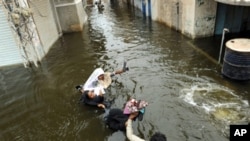There is an urgent need to accelerate efforts to help thousands of people affected by severe flooding in Pakistan's Sindh province, the United Nations said on Wednesday.
Floodwaters are receding in the northwestern province of Khyber Pakhtunkhwa and central Punjab province. As the situation improves, millions of flood victims are planning to return to their destroyed homes and farms and the focus of the emergency is shifting to the southern province of Sindh, where many villages remain under water.
Aid agencies predict it will take another two to three weeks for the waters there to subside enough to allow people to return home.
Pakistan's National Disaster Management Authority estimates the devastating floods have directly affected more than 17.5 million people. Millions remain without adequate food, water and medical care. Another casualty is the agricultural sector.
A spokeswoman for the UN Office for the Coordination of Humanitarian Affairs, Elizabeth Byrs, said in the areas where the floodwaters are receding, the soil remains sodden and covered by a thick layer of sludge or mud. Heavy machinery will be needed to clean up the land before it can be planted said Byrs.
"It may take six to eight weeks before the soil is fit for planting," she said. "And also the loss of... animal power also will seriously compromise the ability of farmers to prepare land. Silt deposit on fields in places considerably deeper than can be plowed, will also make it difficult to clear the fields in time."
The United Nations estimates 3.2 million square hectares of arable land has been inundated by the floods and around 200,000 head of cattle have drowned.
Future food shortages are a great concern, said World Food Program spokeswoman Emilia Casella.
"Given the impact on farmers, given the impact on croplands and the huge loss of livestock, this is going to be a big concern. Normally, the planting season would be starting in mid-September. So, that puts additional pressure on farmers, if they cannot get back to their land," said Casella. "A certain amount of land will potentially not be in a condition to be planted yet."
Casella said the planting season usually lasts about two months. The situation remains critical, she added, and the agency is providing additional assistance to farmers who are able to return to their land. The goal, she said, is to make sure Pakistani farmers have enough food support so they can plant their crops and feed their families.
Emergency Aid Shifts to Pakistan's Flooded South




